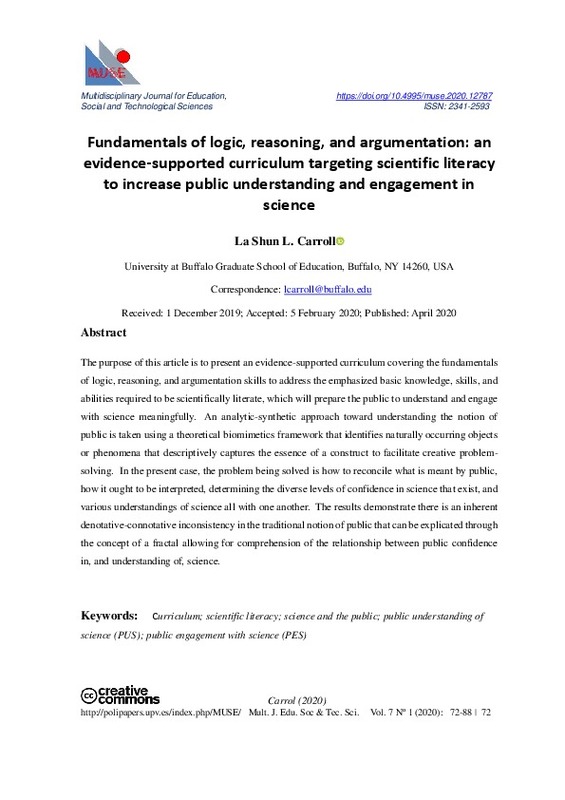JavaScript is disabled for your browser. Some features of this site may not work without it.
Buscar en RiuNet
Listar
Mi cuenta
Estadísticas
Ayuda RiuNet
Admin. UPV
Fundamentals of logic, reasoning, and argumentation: an evidence-supported curriculum targeting scientific literacy to increase public understanding and engagement in science
Mostrar el registro sencillo del ítem
Ficheros en el ítem
| dc.contributor.author | Carroll, La Shun L.
|
es_ES |
| dc.date.accessioned | 2020-05-18T09:38:14Z | |
| dc.date.available | 2020-05-18T09:38:14Z | |
| dc.date.issued | 2020-04-16 | |
| dc.identifier.uri | http://hdl.handle.net/10251/143529 | |
| dc.description.abstract | [EN] The purpose of this article is to present an evidence-supported curriculum covering the fundamentals of logic, reasoning, and argumentation skills to address the emphasized basic knowledge, skills, and abilities required to be scientifically literate, which will prepare the public to understand and engage with science meaningfully. An analytic-synthetic approach toward understanding the notion of public is taken using a theoretical biomimetics framework that identifies naturally occurring objects or phenomena that descriptively captures the essence of a construct to facilitate creative problemsolving. In the present case, the problem being solved is how to reconcile what is meant by public, how it ought to be interpreted, determining the diverse levels of confidence in science that exist, and various understandings of science all with one another. The results demonstrate there is an inherent denotative-connotative inconsistency in the traditional notion of public that can be explicated through the concept of a fractal allowing for comprehension of the relationship between public confidence in, and understanding of, science. | es_ES |
| dc.language | Inglés | es_ES |
| dc.publisher | Universitat Politècnica de València | es_ES |
| dc.relation.ispartof | Multidisciplinary Journal for Education, Social and Technological Sciences | es_ES |
| dc.rights | Reconocimiento - No comercial - Sin obra derivada (by-nc-nd) | es_ES |
| dc.subject | Curriculum | es_ES |
| dc.subject | Scientific literacy | es_ES |
| dc.subject | Science and the public | es_ES |
| dc.subject | Public understanding of science (PUS) | es_ES |
| dc.subject | Public engagement with science (PES) | es_ES |
| dc.title | Fundamentals of logic, reasoning, and argumentation: an evidence-supported curriculum targeting scientific literacy to increase public understanding and engagement in science | es_ES |
| dc.type | Artículo | es_ES |
| dc.identifier.doi | 10.4995/muse.2020.12787 | |
| dc.rights.accessRights | Abierto | es_ES |
| dc.description.bibliographicCitation | Carroll, LSL. (2020). Fundamentals of logic, reasoning, and argumentation: an evidence-supported curriculum targeting scientific literacy to increase public understanding and engagement in science. Multidisciplinary Journal for Education, Social and Technological Sciences. 7(1):72-88. https://doi.org/10.4995/muse.2020.12787 | es_ES |
| dc.description.accrualMethod | OJS | es_ES |
| dc.relation.publisherversion | https://doi.org/10.4995/muse.2020.12787 | es_ES |
| dc.description.upvformatpinicio | 72 | es_ES |
| dc.description.upvformatpfin | 88 | es_ES |
| dc.type.version | info:eu-repo/semantics/publishedVersion | es_ES |
| dc.description.volume | 7 | es_ES |
| dc.description.issue | 1 | es_ES |
| dc.identifier.eissn | 2341-2593 | |
| dc.relation.pasarela | OJS\12787 | es_ES |
| dc.description.references | American Academy of Arts and Sciences (AAAS). America; 2018. | es_ES |
| dc.description.references | Diethelm P, McKee M. Denialism: what is it and how should scientists respond? European Journal of Public. 2009;19(1):2-4. https://doi.org/10.1093/eurpub/ ckn139. | es_ES |
| dc.description.references | Carroll LSL. Theoretical Biomimetics: A biological design-driven concept for creative applied to the optimal sequencing of active learning techniques in educational theory. Multidisciplinary Journal for Education, Social and Technological Sciences, 4(2):80-96. https://doi.org/10.4995/muse.2017.7078. | es_ES |
| dc.description.references | Stevenson A, Waite M. Concise Oxford English Dictionary: Luxury Edition. OUP Oxford; 2011. https://market.android.com/details. | es_ES |
| dc.description.references | Barker-Plummer D, Barwise J, Etchemendy J, et al. Language, proof, and logic (Vol. 2). Stanford, CA: CSLI Publications; 2011. | es_ES |
| dc.description.references | Toulmin SE. The uses of argument. 2003. Cambridge University Press. ISBN: 13 978-0-511-06271-1. | es_ES |
| dc.description.references | Dunlap RE. Climate Change Skepticism and Denial: An Introduction. The American Behavioral Scientist. 2013;57(6):691-98. https://doi.org/10.1177/ 0002764213477097. | es_ES |
| dc.description.references | Mejlgaard N, Stares S. Participation and competence as joint components in a cross-national analysis of scientific citizenship. Public Understanding of Science. 2009; 19(5):545-561. https://doi.org/10.1177/0963662509335456. | es_ES |
| dc.description.references | Jones SK, Noyd RK, Sagendorf KS. (2015).Building a Pathway to Student Learning: A How-To Guide to Course Design. https://market.android.com/ details. | es_ES |
| dc.description.references | Suleski J, Ibaraki M. Scientists are talking, but mostly to each other: a quantitative analysis of research represented in mass media. Public Understanding of Science. 2010; 1(115-125). https://doi.org/10.1177/0963662508096776. | es_ES |








